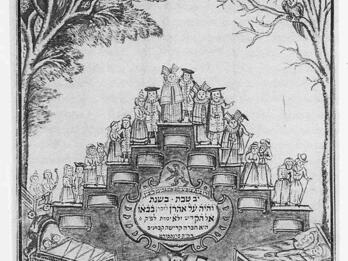Exemplar de penitencia dividido em tres discursos para o dia santo de Kipur (The Pattern of Penitence, or Three Discourses for the Sacred Day of Yom Kippur)
Second Discourse
IX
This disunity among us, the lack of piousness for one another, the civil war of murmurings in places where conversations and visits occur, evils that have caused the past and extend the present captivity—do you know, Sirs, whence they originate? They stem from a pernicious and abominable appetite that we have and have always had for things foreign: all the evil customs, the manner of dress, the abuses and superstitions of foreigners, even when contravening the purity of our ancient and decent practices, even when contravening the truth and integrity of our precepts. We want everything; we crave everything and permit everything. And why do we do this? Because these are practices of foreign origin.
This love of everything that is foreign results in creating within us a disaffection for anything that is a part of our Nation and our fellow Jew. A deed done by a foreigner is widely accepted, simply because it was performed by a foreigner, whereas the acts of our brother, our fellow Jew, even if better by far, are looked upon by us with disfavor. The counsel or judgment of a foreigner, given our love of all things foreign, constitutes a Selomoh [a wise pronouncement], even though it be idiotic, and is tantamount to adjudication, whereas the judgment or counsel of our brother, or fellow Jew, given our displeasure, is depicted as ignorance and idiocy, even if it be adjudication. We believe it worthwhile to squander our health and property on a foreign woman, even if her facial features be enormous and even if she behave indecorously by using brazen speech and leading a scandalous lifestyle. And why do we do this? Because she is a foreigner. Whereas in the case of a woman of our Nation, even though she have a beautiful face, be decorous in her actions, use temperate language, and lead a virtuous life, there is still something amiss, because she is Jewish and not a foreigner, making it unpleasant for us to live with her, as per God’s commandment and to the benefit of our health and property. [ . . . ]
X
This pernicious appetite for everything foreign, ladies and gentlemen, results in vices, as I have said, and all because we wish to judge things by their appearance and how they look. Because if we were to examine the morality or maliciousness of many of the evil customs, superstitions, and abuses of foreigners, we would doubtless be horrified and live much more harmoniously with each other.
Divine Providence fully understood these consequences when it counseled us with great care that we not practice or adopt foreign customs. Experience has shown us, to our detriment, that this deeply rooted love for everything foreign is and always has been the cause of the greatest errors that our Nation has committed in the world.
The most abominable error that our Nation committed in the world was the sin of the Golden Calf. I ask you, what did these men ask for and what did they wish for when they sinned? Did they perhaps ask to worship that calf? Certainly not. What they asked for and what they wished for was to have many gods, who would go before them and teach them the way. Make us gods who shall go before us (Exodus 32:1). For, if what they ask for is to have many gods, how can they be content with only one calf? If what they wish for is to have gods, who can show them the way, how can they be content with one insensitive beast that requires someone to make it move? Now, it is true that they asked for many gods who could show them the way and it is true that only one came out and that it could not move on its own. However, since they came out of Egypt, where the foreigners worshiped a ram, they found themselves confronted with a mere calf, an animal very similar to the gods of Egypt and even though they desired and asked for something else, since this animal was similar to the gods of the foreigners, they immediately accepted it as their god, feasting and sacrificing to it.
Translated by Marvin Meital.
Credits
Jacob de Castro Sarmento, Exemplar de penitencia, dividido em tres discursos, para o dia santo de kypur (The Pattern of Penitence, or Three Discourses for the Sacred Day of Yom Kippur (London: Com licença dos senhores do Mahamad, e aprovoçào do sr haham deste K.K., 1724), pp. 68–71.
Published in: The Posen Library of Jewish Culture and Civilization, vol. 5.



